The Great Commentary of Cornelius à Lapide (8 vols.)
Digital Logos Edition
Overview
Considered one of the most important Catholic theologians and Bible commentators, Cornelius à Lapide's writings on the Bible have remained critical to the Catholic Church for centuries. Although à Lapide's commentaries were written from the Catholic perspective, Christians of all denominations worldwide have benefited from his sound exegesis and the wide-breadth of learning his works provide. Brimming with spiritual devotion and scholarly acumen, à Lapide's commentaries weave together his profound insights into the biblical texts alongside commentary from many Church Fathers, including the Venerable Bede, Cyril of Alexandria, St. Augustine, Tertullian, St. Jerome, Origen, and more.
A trove of biblical wisdom, The Great Commentary of Cornelius à Lapide (8 vols.) brings together the English translations of his greatest works on the New Testament. These commentaries cover the Gospels of Matthew, Mark, Luke, and John, as well as John's Epistles and the Epistles to the Corinthians. With the Logos Bible Software edition all Scripture passages in The Great Commentary of Cornelius à Lapide (8 vols.) are tagged and appear on mouse-over. This makes these resources more powerful and easier to access than ever before for scholarly work or personal Bible study. With the advanced search features of Logos Bible Software, you can perform powerful searches by topic or scripture reference—finding, for example, every mention of “grace,” or “John 3:16.”
- Key works from Cornelius à Lapide
- Verse-by-verse commentary enhanced with writings from the Early Church Fathers
- Completely interactive with all of your Logos resources
It would be gilding the finest gold to bestow praise on the Great Commentary of à Lapide. It is a work of unequalled, we should say unapproached value. We specially entreat the clergy on no account to neglect obtaining so vast a treasure of saintly wisdom, even if in so doing they are obliged to sacrifice many volumes far inferior to it in real helpfulness.
—John Bull
His method makes his commentary not only a valuable work for proficient students of Holy Scriptures, but it further brings the study of the sacred writings within the reach of all educated minds, and at the same time provides a delightful fund of sacred instruction and devotional reading. Cornelius à Lapide loses none of its charms in the clear, pure, vigorous English of its present translation; indeed, we confess that it seems to borrow a new beauty and allurement from its English dress.
—The Month
We set a high store on this commentary. There is about it a clearness of thought, a many-sided method of looking at truth, an insight into the deeper meaning, and a fearless devotion to what appears to him to be truth, which lend a peculiar charm to all that he writes. We heartily commend the work to our ministerial readers.
—Literary World
It is one of the most learned and richest commentaries that have ever been written. They are a storehouse for the preacher and a valuable aid to the devout lovers of the Word of God among the laity.
—Catholic World
A very mine of research and exegetical learning of the rarest kind.
—Standard
It is one of those few 'books which are books,' an unfailing magazine of instruction and devotion of the profoundest views of the Holy Scripture and theology in general, and one of the most valuable and important recently issued from the press.
—Church Review
The varied and solid learning, the intense theological acumen, combined with verbal exegesis of the most comprehensive and practical character, and last, and by no means least, the deep and spiritual insight into the more remote and hidden sense of the Gospel narrative are here displayed in thoroughly idiomatic English, which reads like an original composition rather that a translation.
—The Pilot
To say one word in recommendation of the great work of a Lapide is superfluous, but it is our simple duty to call attention to the great work now being done by Mr. Mossman for English readers.
—Literary Churchman
The commentary is learned, intelligent, and full.
—The Expositor
Mr. Mossman has done his part well, as an able and sympathetic scholar might be expected to do; and the books, both in execution and translation, its worthy of its author.
—Saturday Review
- Title: The Great Commentary of Cornelius à Lapide
- Author: Cornelius à Lapide
- Translators: Thomas W. Mossman, W. F. Cobb
- Volumes: 8
- Pages: 3,478
- Format: Digital › Logos Research Edition
- Resource ID: {532B4E34-3366-4EA1-85B3-13FF30F249A4}
This title is included in the following collections
You can save when you purchase this product as part of a collection.
Commentaries Starter Collectio...
$199.99$39.99Verbum 5 Bronze Legacy Library
$89.99$89.99Verbum 6 Silver Legacy Library
$349.99$349.99Verbum 5 Silver Legacy Library
$349.99$349.99
- $849.99
- $849.99
- $849.99
- $849.99
- $1,499.99
- $1,499.99
- $1,499.99
- $1,499.99
- $1,499.99
- $2,999.99
- $2,999.99
- $2,999.99
- $17,553.16$3,699.99
- $4,749.99
- $4,749.99
- $4,749.99
- $11,399.99
- $11,399.99
- $21,749.99
- $24,999.99
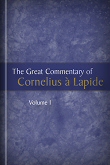
Volume 1 of The Great Commentary of Cornelius à Lapide provides verse-by-verse commentary on the Gospel According to Matthew, chapters 1–9. In the general preface à Lapide addresses:
- The excellence and majesty of the Gospels
- The number, order, agreement, and discrepancies of the Gospels
- The different versions of the Gospels
- The title prefixed to Saint Matthew's Gospel
- and more!
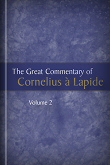
Volume 2 of The Great Commentary of Cornelius à Lapide provides verse-by-verse commentary on the Gospel According to Matthew, chapters 10–21.
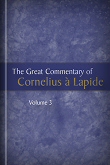
Volume 3 of The Great Commentary of Cornelius à Lapide provides verse-by-verse commentary on the Gospel According to Matthew, chapters 22–28, and the Gospel According to Mark. Lapide provides an in-depth introduction to the life and Gospel of Mark, and also discusses the contributions to the study Mark from numerous Church Fathers, such as S. Jerome, Clement of Alexandria, Papias of Hierapolis, Origen, Eusebius, and more.
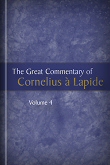
Volume 4 of The Great Commentary of Cornelius à Lapide provides verse-by-verse commentary on the Gospel According to Luke. Lapide provides an in-depth introduction to the life and Gospel of Luke, and also discusses the contributions to the study of Luke from numerous Church Fathers, such as Eusebius, Theophylact, the Venerable Bede, St. Irenaeus, Tertullian, Anselm, and more.
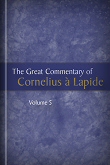
Volume 5 of The Great Commentary of Cornelius à Lapide provides verse-by-verse commentary on the Gospel According to John, chapters 1–11. Lapide provides an in-depth introduction to the life and Gospel of John, and also discusses the contributions to the study of John's Gospel from numerous Church Fathers, such as S. Jerome, Baronius, S. Cyril, S. Augustine, S. John Chrysostom, S. Euthymius, and more.
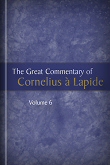
Volume 6 of The Great Commentary of Cornelius à Lapide provides verse-by-verse commentary on the Gospel According to John, chapters 12–21, and the Epistles of John. In the introduction to the Epistles of John, à Lapide examines the authorship, authority, and intentions of the epistles.
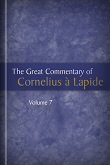
Volume 7 of The Great Commentary of Cornelius à Lapide provides verse-by-verse commentary on the First Epistle to the Corinthians. Lapide provides a synopsis for each chapter, and regularly cites Church Fathers, such as Theophylact, Ambrose, Chrysostom, Anselm, and more, in his in-depth commentary on this Pauline Epistle.
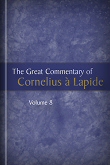
Volume 8 of The Great Commentary of Cornelius à Lapide provides verse-by-verse commentary on the Second Epistle to the Corinthians and the Epistle to the Galatians. Lapide provides a synopsis for each chapter, and regularly cites Church Fathers, such as S. Jerome, Ambrose, Augustine, Ecumemius, and more, in his in-depth commentaries on these Pauline Epistles.
Cornelius à Lapide (1567–1637) was born at Bocholt, in Limburg, Belgium. Educated in philosophy and theology at the University of Douai and the Catholic University of Leuven, Lapide was ordained in 1595. Lapide was a professor of Philosophy, Hebrew, and Theology for over twenty years before dedicating himself full time to writing and editing his celebrated commentaries.
Reviews
5 ratings

David Anfinrud
1/20/2022
The Work is definitely Catholic in writing. Reading the Beatitudes section the emphasis Poor in wealth instead of Poor in Spirit. All about riches of the world instead of Knowledge of God. Shows the weakness of the beliefs. It does give some good writing sources of early Church Fathers. BUt again Emphasis on Catholic traditions over Biblical Truths. Jesus was very much against Tradition. Keeping true to Biblical teachings is a must. We can not be blinded by It has always been this way or that way. We need to seek the Holy Spirits guidance as we read the Bible. WE should all be reading the Bible and studying the word daily. THere may be some good aspects of this collection of writings but agian I may be biased because I found so much truth in other writtings of this time frame that emphasised reading and studying the word. And made me think about my faith in God hopefully making a a stronger and better Christian.Michael Maria Waldstein
8/25/2013

Gregory S. MacBeth
8/8/2013

RevSarge
8/5/2013
Phil Niebergall
7/30/2013